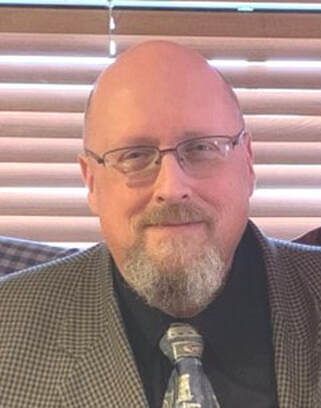This Week's "Word and Walk"
Tuesdays and Thursdays, Pastor Scott leads a devotional featuring study of a book of the Bible and prayer. Click the button below to view the most recent devotions!
Greetings!Rev. Scott Jones has been an American Baptist minister since 1997. He was born in Des Moines, Iowa, growing up in Iowa and South Dakota. He received his Bachelor of Arts in vocal music at Iowa State University in 1994 and earned a Masters in Divinity from Northern Seminary in 1997. He was ordained in 1997 in the Mid-America Baptist Churches (Iowa and Minnesota). Scott is the 21st minister of the First Baptist Church of Greensburg.
Scott first responded to Jesus in faith as a young child and was baptized at age 13. He has been blessed throughout his life with wonderful role models in his parents, ABY youth group, and ABC summer camp, where he was invited to say “yes” to the Lord’s call on his life. His ministry is about worship, preaching, teaching, evangelism, and relationships. He uses his musical background to lead people into the presence of God. He is involved in our Region as instructor of New Testament with the Academy of Christian Training and Service (ACTS), our lay-pastor training institute. He also sings with the Irwin Male Chorus. |
Pastor's Newsletter
A good way to label our present reality is that we live in “anxious times.” There’s no shortage of supply for anxiety right now. The deadly pox of war has erupted over the world--or is threatening to erupt. The conflict between Russia and Ukraine has been joined by the ongoing war between Israel and Hamas in Gaza; this seems poised to pull in Hezbollah and Iran before long. China and Taiwan are tiptoeing up to the brink of invasion and war. Any of these crises threaten to ensnare the U.S. The fact that our leadership on the world stage is now confounded by incompetent, corrupt and weak politicians plays a large role in the viral spread of chaos everywhere we look. The civil unrest, violence, and open looting in our cities demonstrate that we no longer have the order and safety we once enjoyed. The recent, election-year trials and debates have people in both parties panicking. They recognize the enormous stakes involved in today’s world; they know that strong leaders are crucial agents to keep us from plunging headlong into destruction. When all these little wars threaten to metastasize into world war, it’s easy to see why people are unnerved by the future.
What can Christians do? Too many people think it is our duty to be completely informed and intensely worried about our times, as if our collective alarm can somehow alter the course of events and put the world back the way it used to be. They keep putting aside Jesus’ command not to worry. When we worry, we are trying to act as little gods over the future, and only the True God has any control over that.
The last World War was in progress when C.S. Lewis wrote his classic, The Screwtape Letters. It’s a work of satire, but it has some serious insights about the strategies of Satan to keep our faith and witness neutralized. In it, Screwtape is a mid-level management demon who is mentoring his nephew, Wormwood. The inexperienced demon has been put in charge of ensuring the damnation of a young Englishman referred to as “the patient.” Screwtape points out many warning signs that “the patient” might be drifting toward faith in “The Enemy” (God), as well as things that can be used to advantage in leading him away. In chapter 15, there has been a lull in the war. “The patient” is starting to feel less anxious, and Screwtape addresses whether they should do something about that.
Screwtape assures Wormwood that the man’s complacency about the future is perfectly fine, as well as his former terror of the future, so long as he’s still fixated on the future. “Tortured fear and stupid confidence are both desirable states of mind,” he writes. If “the patient” has made up his mind that the future looks rosy, it will only bury him in disappointment when “his false hopes are dashed.” As soon as the destruction picks up again, he will once again be consumed by his fear, as if by building up the proper amount of anxiety he can somehow change the outcome. The demon writes, “We want a man hag-ridden by the Future--haunted by visions of an imminent heaven or hell on earth--ready to break the Enemy’s (God’s) commands…if…we make him think he can attain the one or avert the other” (emphasis mine). You see Screwtape’s emphasis here: the demons want us playing God, acting as if we can author our own future if we focus our thoughts on it enough. That’s a trick we play on ourselves, of course--there’s no way we can either know or change the future by our concentration. But that’s the Evil One’s ploy: by encouraging that delusion, Screwtape writes, “we make them think of unrealities.”
To be avoided at all costs, he counsels Wormwood, is for “the patient” to reorient his thoughts around what he can do in the present. Around him are a number of people whose lives he can influence by friendship and service. There are events taking place in his corner of existence that could be changed for the better if he’d turn his thoughts and energies there--especially if he did so in the service of God. No, Screwtape writes, “it is better for your patient to be filled with anxiety or hope (it doesn’t matter which) about this war than for him to be living in the present.”
C.S. Lewis is trying to remind us that the present--our present--is the sole frame in which God has given us the ability and accountability to act. The past is settled and gone. We can’t change it, though we might sometimes try to avoid our present responsibilities by dwelling on the past. That one convicted me a bit: when things get too ominous and overwhelming, I often escape to books of fiction or history about times long past. Screwtape writes that demonic forces can sometimes tempt people (bookworms like me, for instance) in this way, so that once again, present possibilities are wasted. But God has designed us so that we live in the flow of time. The only thing we can interact with, meaningfully, is the present moment. God has also structured it so that our choices, words, thoughts and actions have a direct bearing on our eternity. Screwtape writes:
[God], I believe, wants them to attend chiefly to two things, to eternity itself, and to that point of time which they call the Present. For the Present is the point at which time touches eternity…He would therefore have them continually concerned either with eternity (which means being concerned with Him) or with the Present--either meditating on their eternal union with, or separation from, Himself, or else obeying the present voice of conscience, bearing the present cross, receiving the present grace, giving thanks for the present pleasure.
God did not design us to be gods. We are His human children, recipients of His grace and benefactors of eternal hope. We are not designed to either know, or to bear the crushing burden of, all the terrible things happening in the world. War, pestilence, or tribulation may come upon us, or they may not. Our focused anxiety cannot affect the outcome one iota. That is God’s jurisdiction, and we must leave it to Him. We only make ourselves suffer when we try to assume responsibilities only He has the strength and knowledge to carry.
What God wants from us is to trust in His goodness so radically that we can rest the ominous future in His Fatherly care. Meanwhile, Jesus commands us to “seek first His kingdom and His righteousness, and all these things will be given to you as well.” (Matt. 6:33) To translate, you and I are only expected to use the present moment for drawing closer to our Father and for spreading His love to the people around us, right now. All the rest is God’s. So, shut off the TV. Stop the doom-scrolling. In prayer, place your burdens at God's feet, where they belong. Be at peace in the shelter of His wings, and use your present opportunities for the eternal good of your own soul, as well as your neighbor’s.
Your Brother and Servant,
Pastor Scott.
What can Christians do? Too many people think it is our duty to be completely informed and intensely worried about our times, as if our collective alarm can somehow alter the course of events and put the world back the way it used to be. They keep putting aside Jesus’ command not to worry. When we worry, we are trying to act as little gods over the future, and only the True God has any control over that.
The last World War was in progress when C.S. Lewis wrote his classic, The Screwtape Letters. It’s a work of satire, but it has some serious insights about the strategies of Satan to keep our faith and witness neutralized. In it, Screwtape is a mid-level management demon who is mentoring his nephew, Wormwood. The inexperienced demon has been put in charge of ensuring the damnation of a young Englishman referred to as “the patient.” Screwtape points out many warning signs that “the patient” might be drifting toward faith in “The Enemy” (God), as well as things that can be used to advantage in leading him away. In chapter 15, there has been a lull in the war. “The patient” is starting to feel less anxious, and Screwtape addresses whether they should do something about that.
Screwtape assures Wormwood that the man’s complacency about the future is perfectly fine, as well as his former terror of the future, so long as he’s still fixated on the future. “Tortured fear and stupid confidence are both desirable states of mind,” he writes. If “the patient” has made up his mind that the future looks rosy, it will only bury him in disappointment when “his false hopes are dashed.” As soon as the destruction picks up again, he will once again be consumed by his fear, as if by building up the proper amount of anxiety he can somehow change the outcome. The demon writes, “We want a man hag-ridden by the Future--haunted by visions of an imminent heaven or hell on earth--ready to break the Enemy’s (God’s) commands…if…we make him think he can attain the one or avert the other” (emphasis mine). You see Screwtape’s emphasis here: the demons want us playing God, acting as if we can author our own future if we focus our thoughts on it enough. That’s a trick we play on ourselves, of course--there’s no way we can either know or change the future by our concentration. But that’s the Evil One’s ploy: by encouraging that delusion, Screwtape writes, “we make them think of unrealities.”
To be avoided at all costs, he counsels Wormwood, is for “the patient” to reorient his thoughts around what he can do in the present. Around him are a number of people whose lives he can influence by friendship and service. There are events taking place in his corner of existence that could be changed for the better if he’d turn his thoughts and energies there--especially if he did so in the service of God. No, Screwtape writes, “it is better for your patient to be filled with anxiety or hope (it doesn’t matter which) about this war than for him to be living in the present.”
C.S. Lewis is trying to remind us that the present--our present--is the sole frame in which God has given us the ability and accountability to act. The past is settled and gone. We can’t change it, though we might sometimes try to avoid our present responsibilities by dwelling on the past. That one convicted me a bit: when things get too ominous and overwhelming, I often escape to books of fiction or history about times long past. Screwtape writes that demonic forces can sometimes tempt people (bookworms like me, for instance) in this way, so that once again, present possibilities are wasted. But God has designed us so that we live in the flow of time. The only thing we can interact with, meaningfully, is the present moment. God has also structured it so that our choices, words, thoughts and actions have a direct bearing on our eternity. Screwtape writes:
[God], I believe, wants them to attend chiefly to two things, to eternity itself, and to that point of time which they call the Present. For the Present is the point at which time touches eternity…He would therefore have them continually concerned either with eternity (which means being concerned with Him) or with the Present--either meditating on their eternal union with, or separation from, Himself, or else obeying the present voice of conscience, bearing the present cross, receiving the present grace, giving thanks for the present pleasure.
God did not design us to be gods. We are His human children, recipients of His grace and benefactors of eternal hope. We are not designed to either know, or to bear the crushing burden of, all the terrible things happening in the world. War, pestilence, or tribulation may come upon us, or they may not. Our focused anxiety cannot affect the outcome one iota. That is God’s jurisdiction, and we must leave it to Him. We only make ourselves suffer when we try to assume responsibilities only He has the strength and knowledge to carry.
What God wants from us is to trust in His goodness so radically that we can rest the ominous future in His Fatherly care. Meanwhile, Jesus commands us to “seek first His kingdom and His righteousness, and all these things will be given to you as well.” (Matt. 6:33) To translate, you and I are only expected to use the present moment for drawing closer to our Father and for spreading His love to the people around us, right now. All the rest is God’s. So, shut off the TV. Stop the doom-scrolling. In prayer, place your burdens at God's feet, where they belong. Be at peace in the shelter of His wings, and use your present opportunities for the eternal good of your own soul, as well as your neighbor’s.
Your Brother and Servant,
Pastor Scott.




